TEAM
LAB MEMBERS

Dariusz Plewczyński
lab leader
PhD DSc
Dariusz Plewczynski, PhD, is an assistant professor at University of Warsaw, the head of Functional and Structural Laboratory in Center of New Technologies CeNT, Warsaw, Poland. His expertise covers functional and structural genomics with the special focus on higher-order chromatin organization and its impact on gene regulation and transcription. The major computational tools that are used in his interdisciplinary research team include statistical data analysis (GWAS studies, clustering, machine learning), genomic variation analysis using diverse data sources (karyotyping, confocal microscopy, aCGH microarrays, next generation sequencing: both whole genome and whole exome), bioinformatics (protein sequence analysis, protein structure prediction), and finally biophysics (polymer theory and simulations) and genomics (epigenetics, genome domains, three dimensional structure of chromatin).
Tel: (+48 22) 55 43 654
E-mail: d.plewczynski(at)cent.uw.edu.pl
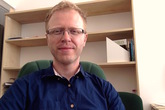
Michał Łaźniewski
researcher
PhD
Michał Łaźniewski scientific interest focus mostly on proteins their sequence, structure, function and interactions with small drug-like compounds. Constant progress in sequencing techniques results, among others, in the exponential growth of the number of known protein sequences. Using profile and meta-profile methods this new sequences can be linked to other alre ady characterized proteins. These information can be used to group similar proteins, predict the structure of newly identified ones and ,to some extent, predict their function. These tasks can be achieved even if compared object share only marginal sequence similarity. Using protein structure a number of analysis can be performed, protein dynamics, predicting protein-protein interactions or calculating binding affinities of small molecules to interesting proteins. These analysis can help us to better understand biological processes at the molecular level and to to predict new drugs.
E-mail: m.lazniewski(at)cent.uw.edu.pl
Research areas: FUNCTIONAL GENOMICS

Przemysław Szałaj
researcher
PhD candidate
Przemek Szałaj is interested in the functional and structural genomics, with a particular interest in the 3D chromatin organization. He developed simulation software for inferring the multiscale chromatin models using Hi-C and ChIA-PET data. Currently he works on applying the bioimaging data for refinement of the simulations. He is also interested in the variation of the structural genomic properties and their inheritance, with the ultimate goal being to better understand the significance of the genome folding on its function and the mechanisms that govern it.
E-mail: p.szalaj(at)cent.uw.edu.pl
Research areas: STRUCTURAL GENOMICS

Weronika Wronowska
researcher
MSc
Weronika Wronowska interests are focused on Systems Biology. In particular in the area of her interest is mathematical modeling of life processes and functional analysis of high through-put proteomic, transcriptomic and lipidomic data. She was involved in the project in collaboration with MD Anderson Cancer Center investigating heterogeneity of gene expression profile of bladder cancer subtypes. In which thanks to a comprehensive analysis of transcriptomic data, it managed to establish markers of tumor progression. Currently, her research focuses on a formal modeling of the sphingolipid metabolism. In particular the role of this bioactive lipids in progression of human disease like cancer and neurodegenerative disorders. In this field a variety of modeling approaches are used, such as deterministic modeling using different types of kinetics and constraint based large-scale modeling of whole cellular metabolism. She is also interested in developing of new tools for integration of high through-put data with formal models. Her two main goals are (i) development of a global cellular metabolism model of high predictive value, and (ii) dissemination of mathematical models as tools for medical diagnosis and the design of new drugs.
E-mail: w.wronowska(at)cent.uw.edu.pl
Research areas: BIOLOGICAL SYSTEMS MODELING
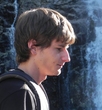
Michał Sadowski
researcher
BSc
Michał Sadowski interests are from the field of physics and genome biology and are presently focused on genome architecture, genome organization and their link to gene regulation. These areas of study can be explored by an analysis of data coming from experimental methods which capture chromatin conformation both locally (3C, 4C) and genome-wide (Hi-C and ChIA-PET). This analysis can lead us to better understanding of gene expression mechanisms and provide a new insight into relation between gene expression and genomic variation. In his present work Michał Sadowski is trying to combine conformation capture data, genomic variation data and gene transcription data, in order to pursue more complete explanation of gene regulation processes, genome spatial arrangement and its evolution.
E-mail: m.sadowski(at)cent.uw.edu.pl
Research areas: STRUCTURAL GENOMICS

Grzegorz Bokota
researcher
MSc
Grzegorz Bokota interests are focused on developing algorithm for microscope image analyzing and massive parallel modeling of cell colony. In image analysis created algorithm are focused on nuclei segmentation and nuclei analysis of the interior of the nucleus.
E-mail: g.bokota(at)cent.uw.edu.pl
Research areas: STRUCTURAL GENOMICS , BIOLOGICAL SYSTEMS MODELING
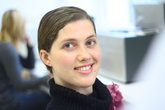
Teresa Szczepińska
researcher
PhD
Teresa Szczepińska, PhD, is a bioinformatician. She has bachelor’s degree in molecular biology from Interfaculty Individual Studies in Mathematical and Natural Sciences at Warsaw University and master’s degree in bioinformatics from VU University Amsterdam. She accomplished doctoral degree at Nencki Institute of Experimental Biology, Polish Academy of Sciences. Teresa’s research interest is in genomic data, higher order chromatin organisation and its relation to transcription regulation. She is experienced in high throughput sequencing data analysis and in retrieving of biological information with it’s knowledge-based selection.
E-mail: t.szczepinska(at)cent.uw.edu.pl
Research areas: STRUCTURAL GENOMICS
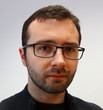
Michał Denkiewicz
researcher
PhD candidate
Reasercher with degrees in experimental cognitive psychology and computer science. Strong background in statistics and machine learning. Primary research area include mathematical modeling of problem solving and decision making in small groups. Scientific intrests: multiagent systems, social and embodied cognition, theory of cognitive systems.
E-mail: m.denkiewicz(at)cent.uw.edu.pl
Research areas: BIOSTATISTICS AND COGNITIVE COMPUTING

Wayne Dawson
researcher
PhD
Wayne Dawson, PhD, is a physicist and structural biologist. He has been a postdoc in the Laboratory of Functional and Structural Genomics since April 2016. He received his PhD from The University of Tokyo. His main focus over the years has been on RNA/protein structure prediction and folding, electron transfer proteins, and currently, chromatin structure and problems related to the influenza virus.
E-mail: dawsonzhu(at)gmail.com
Research areas: STRUCTURAL GENOMICS
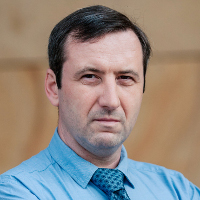
Michal Pietal
researcher
Executive DBA, PhD
Michal has been researching transformations of chromatin 2D interaction matrices (Hi-C / ChIA-PET) into 3D models or ensembles, with the use of various 2D processing techniques, including fuzzy graph distance maps and Multi-Dimensional Scaling (MDS). He was also involved in Hemagglutinin molecule de novo modelling, with the use of fuzzy contact maps of homologous templates from PDB. In addition, he was engaged in protein-protein interface classification from sequence data, with 2D maps prediction stage.
More recently, he has been working on the effort to create a measure comparing different source data (i.e. 2D, 4D) describing chromatin 3D structure, with the use of an entropy measure over the source data. Also, designed and continues the development of cell-cycle-driven 3D re-modelling pipeline, to be merged with the HSP70 expression data and mathematical modelling thereof.
Research areas: STRUCTURAL GENOMICS

Anna Maria Rusek
intern
PhD student
Anna Maria Rusek graduated Silesian University as a Master of Science in Biotechnology and completed postgraduate studies at Jagielonian University in the area of Laboratory Medicine. Currently she is a PhD student at Interdisciplinary Doctoral Studies in English at Medical University of Bialystok in cooperation with CeNT and in the process of caring out specialization in the field of Laboratory Medical Genetics in Łódź. The main field of interests is medical biology, in particular cancer signalling pathways and microRNAs involvement in cancer progression and molecular medicine, especially mechanisms of novel gene and immune therapies as well as molecular aspects of resistance to existing therapies.
Research areas: BIOLOGICAL SYSTEMS MODELING
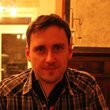
Denis Kazakievich
researcher
PhD student
Denis is a PhD student at joint interdisciplinary PhD program at Uniwersytet Medyczny w Białymstoku and Universiteit Hasselt. He is working to construct statistical models for RNA-Seq data analysis and to develop practical applications of whole-cell modeling . He earned MEng in Bioinformatics from Politechnika Wrocławska and MD from Medical University of Grodno.
Research areas: BIOLOGICAL SYSTEMS MODELING

Ziad Al Bkhetan
researcher
PhD student
Ziad Al Bkhetan is a PhD student at University of Warsaw, He obtained his master degree in computer science from Warsaw University of Technology, Faculty of Mathematics and Information Science. He has good experience in Software Engineering, Data Mining and GPU Programming. Currently he is working on Genomic Interactions Prediction.
E-mail: z.albkhetan(at)cent.uw.edu.pl
Research areas: STRUCTURAL GENOMICS , BIOSTATISTICS AND COGNITIVE COMPUTING
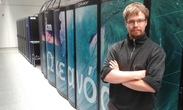
Michał Kadlof
researcher
PhD student
Michał Kadlof graduated with a degree in bioinformatics and engineering studies in computer science with a specialization in database engineering. Currently he is doing a PhD in the Faculty of Physics at the University of Warsaw. His main interests are in computer simulations of the dynamics of biopolymers - proteins and nucleic acids. In the past, he dealt with protein structure prediction, and topology of proteins. Currently is conducting research on multiscale force fields that describe the behavior of chromatin within the nucleus. In addition, he is a computer systems administrator. He spends his free time doing electronics, hiking and medieval historical reenactments.
Tel: (+48 22) 55 43 752
E-mail: m.kadlof(at)cent.uw.edu.pl
Research areas: STRUCTURAL GENOMICS

Paulina Urban
researcher
PhD student
Paulina Urban is a PhD student at The Inter-Faculty Studies in Mathematics and Natural Science at Warsaw University. Her supervisors are professor Jan Karbowski and professor Dariusz Plewczyński. She is a biologist and neuroinformatics. The main field of interests is signal and image analysis.
Research areas: BIOSTATISTICS AND COGNITIVE COMPUTING , BIOLOGICAL SYSTEMS MODELING

Zofia Parteka
researcher
MSc student
Zofia Parteka interests focus mostly on 3D structure modelling and combining structural and functional genomic data. She is currently working on her masters degree in the field of Bioinformatics and Systems Biology. In her current work she is trying to use ChIA-PET data in 3D chromatin modelling.
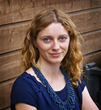
Agnieszka Kraft
researcher
MSc student
Agnieszka Kraft is a student at the Bioinformatics and Systems Biology master's programme. Her interests are in genome architecture, especially structural variants and their link to phenotypes.
Research areas: STRUCTURAL GENOMICS

Karolina Jodkowska
researcher
PhD
Karolina Jodkowska completed her BSc and MSc in Biology at the University of Warsaw. She did her PhD at the Spanish National Cancer Research Centre (CNIO) in Madrid studying spatial organization of DNA replication in the nucleus. Her interests are focused on understanding how basic cellular processes such as replication, transcription and DNA repair are coordinated in the context of three-dimensional organization of chromatin

Natalia Zawrotna
researcher
MSc student
Natalia Zawrotna is a student of Molecular Biology master's program at the University of Warsaw. She is interested in the functional and structural genomics. The main field of interests is long-range chromatin interactions and spatial genome organisation. She is a member of the TEAM. In collaboration with other members they application to experimental work in NGS-based 3D genomics techniques: Hi-C, ChIA-PET and HiChIP (chromatin conformation capture).
Tel: (+48 22) 55 43 678
E-mail: n.zawrotna@cent.uw.edu.pl

Anup Kumar Halder
researcher
PhD student
Anup Kumar Halder is a Visvesvaraya PhD Fellow in the department of Computer Science and Engineering, Jadavpur University, India under the guidance of Dr. Subhadip Basu. He received his Bachelor of Technology degree in Computer Science and Engineering from Bankura Unnayani Institute of Engineering, Bankura, India in 2011 and Masters of Engineering degree in Computer Science and Engineering from Jadavpur University, Kolkata, India in 2014. He received Ministry of Human Resource Development (MHRD),GOI sponsored GATE scholarship for his Post Graduate degree. His area of current research interest is Computational Biology and Bioinformatics.He developed clustering algorithm for large biological sequences, predictive system for Protein Protein Interactions and interaction network analysis.

Andrzej Szczepańczyk
researcher
MSc student
Andrzej Szczepańczyk studied at Military University of Technology in cybernetics departement, IT faculty in 2012-2016. He is a C/C++ and Python programmer. He is currently working on his masters degree at ICM since October 2018r. In his current work he is working on 3D modelling microscopy data. He is also interested in mathematical modelling. He spends his free time singing and solving mathematical puzzles.

Anna Bugaj
researcher
MSc student
Student at Cognitive Science master’s programme, interested in molecular biology of cognitive and mental disorders, particularly Alzheimer’s Disease, Depression and Autism Spectrum Disorders. Working on master thesis exploring Structural Variants and SNPs from ASD in context of chromatin architecture.
FORMER LAB MEMBERS

Benedykt Rak
researcher
PhD candidate
Benedykt Rak interests are focused on studies regarding protein-ligand interaction, mainly Molecular Docking. Attempts to make use of vast bio logical data for improving current docking methods. Statistical Data analysis. Application in silico studies for drug development process.
Current work: Coordinating two drugstores / pharmacies.
WWW: Link
Research areas: FUNCTIONAL GENOMICS

Julian Zubek
researcher
PhD
Julian Zubek is a computer scientist at heart. During his master studies he was interested in programming languages and compilers. He was investigating memory management strategies used in modern script languages interpreters, he also co-developed Skarb -- an experimental Ruby to C compiler. Currently his main research interests shifted towards machine learning, ensemble classifiers, and their applications in bioinformatics. He has experience in statistical data analysis of proteomic and epigenetic data. He is researching a multi-level and multi-scale approach to classification of biological entities, in which information from various sources and different levels of description are combined to make a successful prediction. Julian is using Python programming language on everyday basis. He enjoys sharing his expertise with others and popularizing Python infrastructure for data analysis.
E-mail: j.zubek(at)cent.uw.edu.pl
Research areas: BIOSTATISTICS AND COGNITIVE COMPUTING

Marcin Tatjewski
researcher
PhD candidate
Marcin Tatjewski is focused on inventing and applying data min ing and machine learning methods aimed at extracting novel information from large -scale data sets. His current challenges are in processing proteomics data – from single-organism proteomes or function- specific sets of protein segments up to analyzing complet e set of known proteins. He likes to spend most of his time on exploring Distributional Proteo mics – his idea for modelling amino-acid relationships based on computational analysis of their distributions in large-scale protein sets.
Current work: Associate at The Boston Consulting Group.
WWW: Link
Research areas: BIOSTATISTICS AND COGNITIVE COMPUTING

Przemysław Wróblewski
IT specialist
MSc
Przemek is a programmer. He has a Bachelor degree in Computer science and a Master degree in Psychology from the University of Warsaw, Poland. He is designer of this site.
E-mail: p.wroblewski(at)cent.uw.edu.pl
Research areas: STRUCTURAL GENOMICS , FUNCTIONAL GENOMICS , BIOSTATISTICS AND COGNITIVE COMPUTING

Giovanni Mazzocco
researcher
PhD candidate
Giovanni is a bioinformatician and data scientist. He has a Bachelor degree in Biotechnology and a Master degree in Industrial Biotechnology from the University of Padua, Italy. He is a PhD candidate at the Institute of Computer Science at the Polish Academy of Sciences (specialisation: data science). His main scientific interests are Bioinformatics and Data science.
E-mail: g.mazzocco(at)cent.uw.edu.pl
Current work: http://www.ardigen.com/index.php/en/
Research areas: BIOLOGICAL SYSTEMS MODELING , BIOSTATISTICS AND COGNITIVE COMPUTING

Jan Kostrzewa
Working in LCR group
MSc
My research interest is time series forecasting and implementation of time series prediction methods in biology. My private hobby is space industry (remnant of his student days and activities in the SKA).
Tel: 506493366
E-mail: kostrzewajanek(at)gmail.com
Current work: Working in done business (AI algorithms).
WWW: Link
Research areas: BIOLOGICAL SYSTEMS MODELING , BIOSTATISTICS AND COGNITIVE COMPUTING

Piotr Migdał
data visualization
PhD
Data science freelancer with PhD in quantum optics and information theory from ICFO - The Institute of Photonic Sciences, Castelldefels, Spain. Current interests: machine learnings, data visualization, gifted education.
E-mail: pmigdal(at)gmail.com
Current work: Presently Chief Workshop Instructor at deepsense.io. Designing and leading workshops in Machine Learning (Python, scikit-learn) and Big Data (Apache Spark). Previous editions in: San Francisco (July 2015), New York (Oct 2015), London (Nov 2015).
WWW: Link
Research areas: FUNCTIONAL GENOMICS

Kamen Radew
researcher
MSc
Kamen is experienced data scientist having a keen interest in data-induced headaches that cannot be relieved with conventional remedies. Those include, but are not limited to, problems from the area of Big Data (from gigabytes to petabytes). He is developing new bioinformatical tools and their application to analyze the connection between genotype and phenotype in case of various diseases of affluence (cancer, diabetes, coronary heart disease, etc.) as well as the impact of the genotype on the immune system based on influenza virus infection.
E-mail: k.radew(at)cent.uw.edu.pl
Current work: Working as the project manager at PWC; Data Science Senior Manager @ PwC.
WWW: Link

Miguel Ángel Lermo Jiménez
researcher
PhD student
Miguel Angel has a master degree in Biotechnology from University of Malaga. He is a PhD student in the Laboratory of Imaging Tissue Structure and Function of Nencki Institute of Experimental Biology PAS. His main field of study is Molecular biology and Microscopy, having a strong interest in Programming.
Research areas: FUNCTIONAL GENOMICS , BIOLOGICAL SYSTEMS MODELING